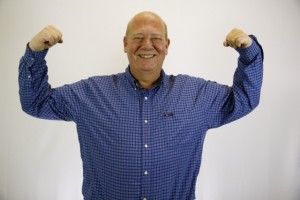The Mental Wellness Counseling “Meet the Counselors” series offers a deeper look into each counselor’s background, experiences, motivations, values, and philosophies. In this series, I put counselors on the couch to learn why and how they do what they do.
A New Start
The 2008 economic recession catalyzed a life-changing series of events for Steve Greenman. Within eight months, he was forced to close the doors on a business he owned for thirty years; he also lost his home, his marriage, and his father. Along with his two sons, he moved from a roomy house in Traverse City to an apartment with only a handful of rooms. “I remember my oldest son looking around the apartment saying, ‘you know, dad, we had a lot of wasted space at the old place,’” Greenman said. With the support of his sons and a newfound respect for self care, Greenman was able to adapt and grow from all of the sudden changes. “How I’ve been able to get through those circumstances was invaluable. As a counselor, those life experiences have been just as important as my education.”
Years later, memories of his former self became relatable anecdotes to utilize in his counseling practice. “By the time you get to my age, you’ve experienced a lot of different things,” Greenman said. “I probably share with clients more than other therapists. I can give them scenarios that I lived through so they don’t feel isolated, that they’re the only one feeling this way.”
Individual Therapy
With the diversity of clientele that enter his office, the focus of Greenman’s practice is tailoring to each individual. “We’re all wired differently, so my client is the theory,” he said. “Therapists have to be like chameleons. We adapt to each and every person.” To foster a comfortable environment with younger clients, Greenman may donn a T-shirt and shorts. For other clients—like PTSD victims or substance users—adapting may mean trying different therapies such as psychotherapy, cognitive conditioning, or motivational interviewing.
Persistence is Key
However, Greenman says “there are no easy answers” to any type of therapy. His most difficult cases tend to involve working with clients suffering from PTSD. With PTSD and couples counseling, “it can be really difficult because you don’t know if you’re getting anywhere or making it worse.” Making progress requires both Greenman and his clients to persist through the thick of any situation. In other words, “you have to root out the weeds and let the dust settle to be able to patch the new lawn,” Greenman said. In particular, helping clients understand the “underlying currents” to their own behaviors is what encourages change. “Change doesn’t happen from me, it all happens from the client,” he says. Seeing substance users gain sobriety or PTSD victims adopt coping strategies are some of Greenman’s most memorable experiences as a counselor.
“Steve, You’re Fired”
Through attending to each person’s needs, respecting individuality, and helping clients discover strategies for self sustainability, Greenman looks forward to the day that his clients walk out his door and never need to come back. “I tell clients when I first meet them that their goal is to fire me,” he said. “Some clients like a periodic check-in, others fire me after a month. That’s what I want, no matter how long it takes.”

Click here to learn more about Steve or to schedule an appointment.
